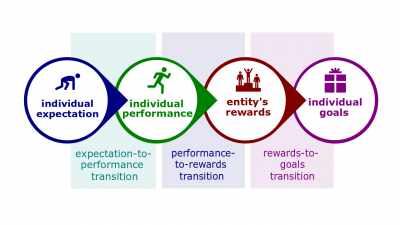Difference between revisions of "Expectancy theory"
(Created page with "400px|thumb|right|[[Expectancy theory]]Expectancy theory (hereinafter, the ''Theory'') is the theory that suggests that an individual te...") |
|||
| Line 1: | Line 1: | ||
[[File:Expectancy-theory.png|400px|thumb|right|[[Expectancy theory]]]][[Expectancy theory]] (hereinafter, the ''Theory'') is the [[theory]] that suggests that an individual tends to act in a certain way based on the expectation that the act will be followed by a given outcome and on the attractiveness to the individual. The [[path-goal model]] has been developed based on that ''Theory''. | [[File:Expectancy-theory.png|400px|thumb|right|[[Expectancy theory]]]][[Expectancy theory]] (hereinafter, the ''Theory'') is the [[theory]] that suggests that an individual tends to act in a certain way based on the expectation that the act will be followed by a given outcome and on the attractiveness to the individual. The [[path-goal model]] has been developed based on that ''Theory''. | ||
| + | |||
| + | ==Definitions== | ||
| + | According to [[Organizational Behavior by Robbins and Judge (17th edition)]], | ||
| + | :[[Expectancy theory]]. A theory that says that the strength of a tendency to act in a certain way depends on the strength of an expectation that the act will be followed by a given outcome and on the attractiveness of that outcome to the individual. | ||
==Related coursework== | ==Related coursework== | ||
Revision as of 05:07, 26 November 2018
Expectancy theory (hereinafter, the Theory) is the theory that suggests that an individual tends to act in a certain way based on the expectation that the act will be followed by a given outcome and on the attractiveness to the individual. The path-goal model has been developed based on that Theory.
Definitions
According to Organizational Behavior by Robbins and Judge (17th edition),
- Expectancy theory. A theory that says that the strength of a tendency to act in a certain way depends on the strength of an expectation that the act will be followed by a given outcome and on the attractiveness of that outcome to the individual.
